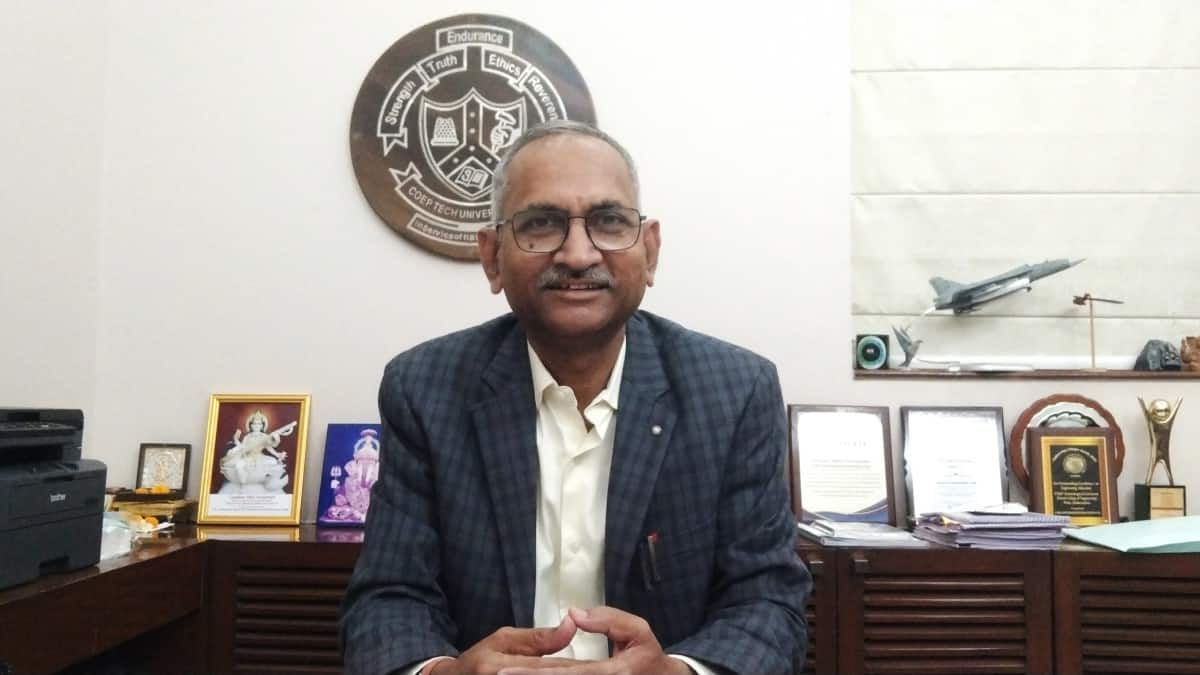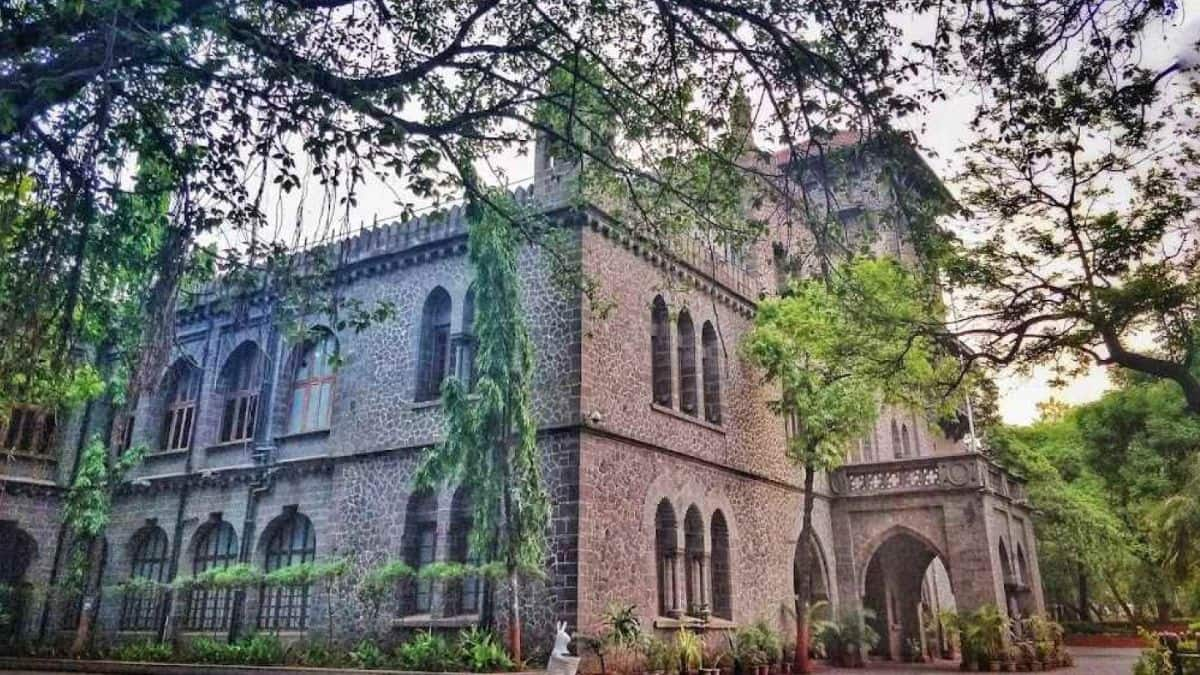COEP Pune will ‘double’ BTech computer science, electrical engineering seats: VC
Musab Qazi | April 17, 2025 | 12:18 PM IST | 9 mins read
Now COEP Technological University, it has already increased the intake in BTech Electronics and will ‘add a division for an AI course’, says VC Sunil Bhirud.

PUNE: The College of Engineering Pune – or, COEP Pune – the third-oldest technical education institute in the country, is now a unitary technological public university. Since acquiring that tag, the 170-year-old institute is seeking to diversify its academic programmes, increase intake in its BTech programmes, and collaborate with foreign universities.
Sunil Bhirud, vice chancellor of COEP Technological University Pune speaks to Careers360 about his plans for the university, the importance of integrating engineering education with humanities and the Indian Knowledge System (IKS), aligning tech schools with the industry and what recruiters look for in new hires.
Also read Live Updates: JEE Main 2025 results
How has COEP changed after becoming a university?
We became a university on June 21, 2022, the same year the National Education Policy (NEP) was being rolled out. We were among the first institutes to implement various provisions, including the multiple-entry-and-exit system, though no student has opted for it so far.
In a unique initiative, we introduced a two-month mandatory social internship in the summer vacation after the first year of an undergraduate programme. This entails working in places like hospitals, revenue offices and non-government organisations. These internships help students understand society and its problems, and propel them towards solving issues using technology.
We already have the regular technical internships after the second and third years, followed by a semester-long apprenticeship in the final year. The idea is that the students start acquiring knowledge from the beginning, keep adding to it and then engage in practical work.
To help students navigate career options, we have introduced a multi-disciplinary curriculum. We have a list of around 20 minor subjects, including finance, public policy, history and quantum computing, as well as foreign languages, based on students’ interest. These are offered over four semesters for a cumulative credit of 14. We are roping in premier institutes in Pune, such as Gokhale Institute of Politics & Economics, Bhandarkar Oriental Research Institute and Deccan College, to teach these courses.
Additionally, we offer institute-level electives from other branches of engineering. Our inter-disciplinary curriculum has matured.
In future, we would like to add the Indian Knowledge System (IKS) as an integral part of the curriculum, not merely as an add-on subject. Our faculty members are writing books on physics, metallurgy and engineering drawing in ancient India.
How will you ensure that the IKS component steers clear of pseudoscience and there’s room for critical questioning?
Every research work starts with a survey of how things started and progressed. When we talk about technology, we will be looking into how people in earlier times created things without much technological advancement. More than appreciating them, we want to understand the mathematics and physics behind them.
For example, vedic mathematics enables arithmetic calculations to be done manually. While we may not need those techniques anymore, without knowing them we won’t be able to take research forward. We will focus only on the technological aspects of ancient knowledge.
What other changes have been brought in the curricula and pedagogy?
We have adopted a student-centric approach. We are aggressively bringing experts from the industry to conduct some classes, especially in subjects such as artificial intelligence, data science and instrumentation. We are among the first to appoint seven-eight professors of practice – some teach certain topics, others are responsible for entire courses. They are also helping our faculty in developing laboratories.
Also read Pune Boom: How 15 private universities reshaped higher education in 'Oxford of the East'
Have they made a difference?
We have noticed many differences. While earlier our faculty was a bit wary of the professors of practice, they have now understood their importance. The teachers are now motivated, we are getting new projects and our industry interaction has increased.
Any new courses in COEP Pune?
Last year, we increased the intake capacity of BTech electronics. The number of seats for computer science, civil, electrical and instrumentation engineering will also be doubled in the upcoming academic year, besides adding a division for a course in artificial intelligence (AI) and machine learning. We have also started an MTech programme in Automotive Systems for working professionals. The programme is taught by industry experts and five students will do their projects at Hamm-Lippstadt University in Germany.
We are looking for more such opportunities for students to pursue internships and projects abroad.
Some existing courses, such as Speech and Signal Processing, have been given AI orientation, and their titles have been changed accordingly.
We have also introduced a PhD programme for working professionals, who can work on projects at the firms they are associated with. They will be assigned a primary guide from the institute and another from the industry. They have been allowed to complete the first year of their classes online.
This will create an eco-system where teachers will get to know about the current advances in the industry, which will then percolate to UG and PG students.
Until now, PhDs were done in isolation, with scholars picking random topics and studying them. We are now expecting a more of a product-based approach. Many of our alumni wanted this and admissions will be quarterly.
Does COEP Pune have enough physical infrastructure and teachers for these initiatives?
This is a million-dollar question.
At present, we do have adequate physical infrastructure for new programmes and increased intake. For faculty, we are reaching out to experts and alumni and gathering information about those who are willing to devote some time to teach. These experts will be connected with our faculty as co-teachers and appointed on contract, as per requirement.
With free access to information online, the role of teachers will also change. Instead of classroom instructions, there will be more case-based teaching. In fact, our teachers will also be learning from industry experts.
Also read Top 10 engineering colleges in Maharashtra accepting MHT CET score for BTech admission
This was very much the case when computer science was introduced in engineering. Some teachers had to learn the discipline and then teach. We currently don’t have teachers for AI and data science, but have industry experts. At COEP Pune, the courses in quantum computing and AI are being taught by experts, both online and in person. We are availing of the liberty given in NEP. Some might frown over it but how else will students learn? If one has expertise, students attend classes.
We have started a mission to let students work on whatever projects they want. We have around 50 clubs for students to explore various interests. If you insist that students sit in class, how will they pursue extra curricular activities? One needs the time and mental space to work on practical projects. In fact, these activities develop students’ personalities and even keep them fit physically.
Are these reforms possible at other, smaller colleges?
There’s no doubt that we are privileged. But if a hub-and-spoke model of connecting smaller institutes with more established ones is adopted, they too can change. It may not be possible for them to do everything, but they can explore things locally. In addition to industry-institute linkage, there should be inter-institute interaction to allow for smaller colleges to benefit from connections of their more reputed counterparts.
We have started the Bhau Institute [COEP Pune’s startup incubator] for this purpose. Many of the industries in Pune are not ready to go out of the city for placements. We route industry experts to other institutes through us. They help these colleges on projects and other requirements. There should be smaller programmes on the lines of the central government’s Partnerships for Accelerated Innovation and Research (PAIR) at the state level. The state government is very positive about these things.
Engineering enrollment has once again picked up in Maharashtra, with around 1.5 lakh admitted this academic year. Will there be enough jobs three-four years down the line?
Employment has always been an issue, even when the intake was only 25,000. The key is that one should get into engineering only if they really like it. If students acquire the necessary skills, they will definitely get a job. Even software companies are looking for skills, not graduates.
And if the engineering sector is facing a paucity of jobs, other sectors are no better. In fact, engineering students are relatively better off thanks to their analytical and computing skills.
Also, is employment the sole purpose of education? It’s more about imparting values and creating a balanced mindset. Education and jobs shouldn’t be linked.
The private institutes created an illusion of “100% placements” when no one can guarantee anyone a job. Job fairs and skill-based employment is the future, not campus placements.
We should also have clarity on what to teach the new generation. For example, we hardly teach manual skills, such as plumbing, even though it’s something that AI can’t do.
 COEP is seeking to diversify its academic programmes, increase intake in its BTech programmes, and collaborate with foreign universities. (Source: Official website)
COEP is seeking to diversify its academic programmes, increase intake in its BTech programmes, and collaborate with foreign universities. (Source: Official website)
FAQs
Q 1. How does COEP Pune admit students?
The College of Engineering Pune (COEP) is now a university and admits undergraduate students on the basis of their marks in the state entrance examination for engineering – MHT CET – as well as the national-level, JEE Main. The engineering exam of the MHT CET 2025 is from April 19 and JEE Main 2025 results are expected soon.
For postgraduate, MTech, courses, admission is based on scores in the national-level test, GATE, or the university’s own entrance examination. There is also provision for admission of candidates ‘sponsored’ by their employers.
Q. 2 What are the fees for 4 years of COEP?
The COEP Pune fees for four years of BTech is Rs 5.45 lakh. Fees for COEP Pune courses in management, data and planning, as well as those at the master’s level cost less.
Q. 3 Does COEP have 100% placement?
The College of Engineering Pune does not have 100% placement. As per data furnished by COEP for the 2025 edition of the National Institutional Ranking Framework, its placement rate was 76.3% in 2023 – the most recent figure available. The placement rates over three years are as follows:
2023: 76.3%
2022: 79.6%
2021-22: 80.8%
Q. 4 What is the cutoff for COEP?
In the 2024 admissions based on the JEE Main, the COEP’s cut-offs ranged from 94.5 percentiles for BTech Metallurgy and Material Technology to 99.3 percentiles for BTech Computer Engineering. In the case of admissions based on the state-level exam, MHT CET, closing or cut-off ranks in the past have ranged from 151 for BTech Computer Engineering to below 6600 for BTech Metallurgy and Material Technology.
Q. 5 What is the highest package of COEP Pune?
The COEP Pune does not disclose the highest package. As per data submitted for NIRF 2025, the median salary for the batch that graduated last year was Rs 10,50,00 per annum.
Follow us for the latest education news on colleges and universities, admission, courses, exams, research, education policies, study abroad and more..
To get in touch, write to us at news@careers360.com.